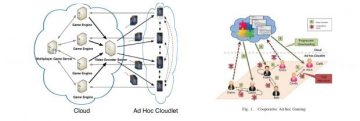
There are some distinct advantages to cloud gaming. In this game design, service is delivered through wifi and computationally intensive tasks are assigned to resources in the cloud. Wifi and reduced hardware demands for the individual gamer makes gaming mobile. By moving from a product to a “gaming as service” model, game development is more cost effective because companies can use a “unified development process”, a more iterative incremental process. As always, there are trade offs. Using near real-time streaming makes the quality of play reliant on network bandwidth and game design is confined by various gaming devices used by clients.
To alleviate some of the demands on network resources in cloud gaming the WiNMoS lab is investigating the advantages of adding an ad-hoc cloudlet to cloud gaming architecture. Through co-operation, ad-hoc cloudlets pool together processing and storage capacities of nearby mobile devices. In this way, some computational tasks can be offloaded to a local ad-hoc cloudlet through device-to-device communication.
In the paper titled, “Ad-hoc Cloudlet Based Cooperative Cloud Gaming” (abstract below), researchers developed a system that allows users to share downloaded game data with each other and enables computation tasks to be dynamically distributed amongst users while taking different game progression into account. The system enables users to offload tasks to the cloud when the ad-hoc cloudlet lacks the processing power for all the computation tasks.
Moving forward from this research, in the paper title, “Reputation-based Multiplayer Fairness for Ad-hoc Cloudlet-assisted Cloud Gaming System”, researchers at the WiNMoS lab considered how to fairly share resources in an ad-hoc cloudlet. The team studied the players’ behavior in cooperative sharing patterns and proposed a reputation-based multiplayer fairness scheme.
Find out more:
Ad-hoc Cloudlet Based Cooperative Cloud Gaming
FangYuan Chi, Xiaofei Wang, Wei Cai and Victor C.M. Leung
Best Paper at the 6th IEEE International Conference on Cloud Computing Technology and Science (CloudCom), Singapore, Dec. 2014.
As the game industry matures, processing complex game logics in a timely manner is no longer an insurmountable problem. Many researchers are now trying to find ways to optimize the gaming system regarding the network usage, local resource utilization, and energy consumption. However, current cloud-based mobile gaming solutions are limited by their relatively high requirements on Internet resources. Also, they typically do not consider the geographical locations of nearby mobile users and thus ignore the potential cooperation among users. Therefore, inspired by existing cloud computing techniques and the concept of ad-hoc cloudlet computing, in this paper, we propose an ad-hoc cloudlet based gaming architecture.
Reputation-based Multiplayer Fairness for Ad-hoc Cloudlet-assisted Cloud Gaming System
Zhen Hong, Wei Cai, Xiaofei Wang and Victor C.M. Leung
Best Paper at the International Conference on Smart Computing (SmartComp), Hong Kong, China, Nov. 2014.
Cloud gaming systems host the game in the cloud, and stream players’ gaming videos to the terminals in the form of encode video frames. To address the high bandwidth issue of realtime gaming video transmission, a cloudlet-assisted multiplayer cloud gaming system was proposed to encourage cooperative
video sharing via a secondary ad-hoc network, on the purpose of exploiting the similarities of video frames among multiple players in a same game. However, the video cooperative sharing among players also introduces fairness problems. In this paper, we complete the ad hoc cloudlet-assisted cloud gaming system by further considering the mobility of terminal devices and the diversity of network quality for distinct players. With mathematical formulation, we study the players’ behavior in cooperative sharing patterns and propose a reputation-based multiplayer fairness scheme in terms of frame encoding. Experimental results illustrate the impact of mobility on the system performance and evaluate that the proposed solution provides better fairness gaming ecosystem compared to the existing platform.
